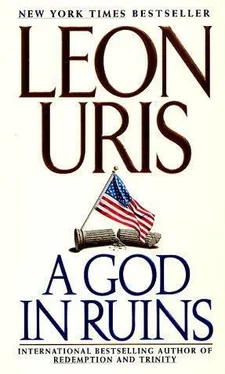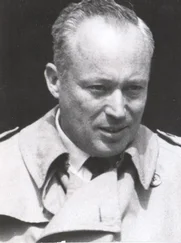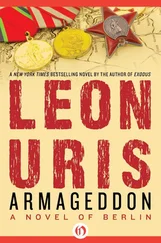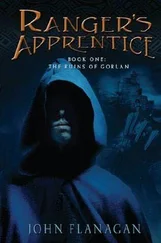“Sorry. You told me you were orphaned at birth.”
Yes, sir.
“My old man,” the general said, “worked Texas ranches and, believe it
or not, was a Baptist preacher on Sundays. We’re all looking for our father, one way or the other. Always trying to do something to make him proud of us. My father never made it big, nor did he live to see me get the first star pinned on my shoulder. First time I was supposed to retire, a long time ago, I got offers for positions not only from every defense plant, but from an airline, an oil company, a chain of ice cream stores. I received over thirty job offers, some at the kind of money I didn’t know existed. I just knew I couldn’t taste ice cream flavors for the rest of my life. What the hell could I do with money, anyhow?” “With your permission, sir,” Quinn said, standing.
“Sure,” he answered with a wave of the hand, “go.”
Quinn could not open the door. He tottered. “Sir.”
“You still here?”
“Sir, tell me the truth, just this once,” Quinn said.
Jeremiah grunted a smile. “I’ll try.”
“This mission?”
“It is the highest priority at the command of the President. I consider it about as important as anything any Marine alive could become involved in. And moreover, it’s a Marine’s fantasy.”
“I, uh, could extend my enlistment for two years.”
“You’ve made old Dogbreath very happy,” the general said. “First thing is to get those stripes off your sleeve. I’m skipping you over second lieutenant to first lieut.”
“I don’t want to sound ungrateful, sir .. .”
“D L. “
But.. .
“There’s too much, too much .. .”
“Back-biting, regulations, kiss-my-ass?” the general volunteered.
“Something like that.”
“You’re a mustang,” Duncan said in reference to enlisted men who always
stayed enlisted at heart, no matter their rank. “When I hit the same
fork in the road,” he continued, “I sure as hell didn’t need
regulations on how to bow on lady’s night. So, they made me a Marine
gunner,” he said in reference to a special warrant officer rank above the enlisted men but below the officers, like a bridge between the two. The exploding-bomb insignias on their epaulets were highly respected. “Marine gunner,” Quinn said. “I like that, sir.” “Gunner O’Connell it is,” Duncan said. “And thanks, Marine.” Quinn knew what Jeremiah meant.
Thus, Jeremiah Duncan’s Recreation and Morale Unit was formed. RAM Company occupied a remote space at Pendleton and in the desert, and its fighters endured a regimen that would make the Navy Seals and Army Rangers cringe. These were light men so as not to add too much weight to the SCARAB load. Major Hugo Grubb, another mustang, honed them to a razor’s edge.
Cherokee Cottrell, who claimed to be half Sioux, had been on the wagon
for five years when Jeremiah pulled him from obscurity to pilot the
SCARAB.
A Harvard failure, Todd Wetmore IV, a super talent with something to prove to his family, came in as copilot and navigator.
A weirdo, Captain Novinski, without whom nothing electronic was purchased by the Corps, found and installed and tested every system now in use or on the planning boards.
Dogbreath got his titanium wing. It was six feet longer than the production wing of aluminum composite. Stronger and more rigid, the black wing made the craft faster, lighter, and able to carry more weight.
The Allison turbo-prop engines were pushed, then pushedagain.
Marine Gunner Quinn O’Connell wore many hats: backup on the electronic board, bombardier, Mayday pilot, and mostly logistics expert. He was given twenty potential worldwide targets to prepare for a counterinsurgency attack.
All the members of RAM Company doubled as medical corpsmen.
Jeremiah attached bomb racks to carry a mix of sixteen missiles, ultra-light, laser-guided, with explosive capacity not yet seen in combat.
What was created was a dual-capacity rototiller that could fly as a helicopter and convert in seconds to a standard turbo jet aircraft. She had a decent subsonic speed of 500 knots and, with spare fuel tanks, a range of two thousand miles. She could carry two dozen men plus pilots and topped out at an altitude of twenty thousand feet.
Every square inch and every pound allowable held a basket of systems, from laser-targeted lock-ons to ground-view.
She carried her own ordnance, crafted to fit her limited space and weight capacities. Her demonstrations were awesome, a lethal bombardment followed by a landing or ground hovering as twenty Marines debarked out of a rear ramp.
Nearly a year passed. The SCARAB was worked into higher levels of performance, as were the men of the RAM team.
In Europe in particular, terrorists kept upping the level of violence with increasing daring. Outside America, her buildings, businesses, and citizens were targeted even though the nation itself had not undergone an attack. This, everyone agreed, was only a matter of time.
The inevitable happened. An Air Force Lear jet crossing the Atlantic from Germany and carrying an American ambassador and an American NATO general blew up in midair.
A series of incredible breaks linked together .. .
In Frankfurt, an Israeli Mossad agent identified Iranians entering Germany and followed them to a rundown hotel in the foreign workers’ part of town. The Mossad informed the CIA.
Air Force Lieutenant Sumner Smith was officer on duty at the small-craft section of the Rhein-Main air base. Contacted by the terrorists, Smith had agreed to plant a briefcase bomb for a hundred thousand dollars.
The pilot of the Lear jet was able to send a Mayday call at the time of the explosion.
In a heightened state of alert, German police were able to catch the terrorists, six Iranians, at the airport and the autobahn hastening to leave Frankfurt.
Lieutenant Smith’s wife, a German national named Helga, discovered the hundred thousand dollars. In a nasty marriage, she took the money to the police.
Four of the Iranians confessed, as did Lieutenant Smith.
The president of the United States clamped on a lid of secrecy. There would be no public announcement. If pressed, they would say an aircraft was missing and they were investigating.
With confessions in their pockets and further confirmation, the President saw a window of opportunity to strike back!
“Jeremiah Duncan here,” Duncan growled.
“Hold up one minute, sir, for the President.” “General?”
Sir.
“One of our Lear jets carrying Ambassador August and NATO General Marplade blew up over the Atlantic about five hours ago. We scored the biggest break in the world by unbelievable apprehensions and confessions. Double and triple verifications are coming in. It was Iranian terrorists.”
it\r
Yes, sir.
“With this news in our pockets,” the President said, “and the Iranians in the dark, we feel we might pull off a counter strike even before our plane is reported missing. Now, has your team done virtual practice on any specific Iranian sites’?”
“Yes, sir, four or five of them.”
“How fast can you get to Washington?”
“I’m on the way. Do I have permission to do a little commandeering here and there?”
“Carte blanche. As soon as you’re in the air, establish communications with the Situation Room. They’ll be looking out for you.”
THE SITUATION ROOM—THE WHITE HOUSE-SEVERAL HOURS LATER
In the basement of the White House, the Situation Room was no futuristic phantasmagoria of a Hollywood intergalactic set, but a conference table ringed with brainy men. Gathered in, the Joint Chiefs of Staff, the director of the CIA, the secretary of Defense, the ranking man at State, the President’s defense adviser, and numbers of indispensable aides.
Читать дальше












